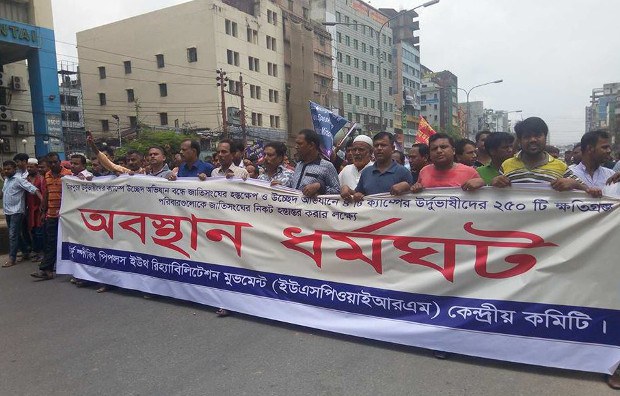Bangladesh: Urdu-speaking Minority Fights Evictions in Dhaka
2017.08.16
Dhaka
 Supporters of the Urdu-Speaking People’s Youth Rehabilitation Movement rally in Dhaka to protest against evictions of members of their minority group from a neighborhood in the Bangladeshi capital, Aug. 9, 2017.
Supporters of the Urdu-Speaking People’s Youth Rehabilitation Movement rally in Dhaka to protest against evictions of members of their minority group from a neighborhood in the Bangladeshi capital, Aug. 9, 2017.
Bangladesh’s High Court has temporarily halted evictions of members of an Urdu-speaking minority from a Dhaka neighborhood after a city agency expelled some 250 families.
Dhaka North City Corporation (DNCC) officials said the families were squatting on city-owned land in Mirpur, but group leaders claimed they had been living there legally for decades.
“Without any notice … the corporation started evictions of Urdu-speaking minority community houses since May 29,” Sadakak Khan Fakku, president of the Urdu-Speaking People’s Youth Rehabilitation Movement, told BenarNews on Aug. 9. “They are removing us from our legal land.”
The Urdu speakers belong to a minority that numbers about 300,000, according to the United Nations. They are referred to in Bangladesh as “Biharis.” Many of them live in refugee camps.
During the partition of the Indian Sub-Continent in August 1947, most of this community migrated from Bihar and other parts of India to what was then known as East Pakistan. Bengali is the predominant language of Bangladesh and Urdu is the main language of Pakistan, against which Bangladeshis fought a war of independence in 1971.
Many from the older generation of Urdu speakers allegedly fought alongside or collaborated with Pakistani forces in the very bloody conflict. After the war, they were stateless in Bangladesh until they were granted citizenship in 2008.
“According to the law, Biharis should live in [refugee] camps, but they came out from camps, illegally occupied the corporation’s land, built houses and stalls, and even are leasing apartments now,” DNCC Chief Estate Officer Md. Aminul Islam told BenarNews. “We are struggling to construct streets in the Mirpur area, according to plans, because of them.”
He said the agency had issued eviction notices several times, but the Urdu speakers did not respond.
“Those Biharis have been occupying streets, footpaths and public properties for decades. We will go for more eviction operations in Mirpur neighborhood and surrounding areas,” Islam said in an interview last week.
The High Court has paused the evictions until a hearing can be held on the matter, scheduled for Aug. 24, in response to a petition filed by the Bihari community, according to the Dhaka Times.
Representatives from the minority group had complained that hundreds of families were evicted without knowing where they could re-settle.
On Aug. 9, supporters of the Urdu-Speaking People’s Youth Rehabilitation Movement rallied in Dhaka to protest the evictions and demand that the United Nations intervene to help them be resettled in new housing.
Sadakak Khan Fakku said that he and some other Urdu leaders went to the Dhaka office of the U.N. Resident Coordinator in Bangladesh to hand over a memorandum spelling out their case.
On condition of anonymity, an official from the office told BenarNews that it would pass the document on to the Bangladeshi government.
“We have nothing to do with this matter,” he said.







